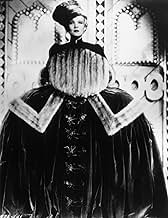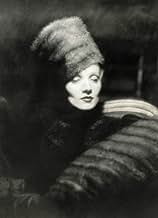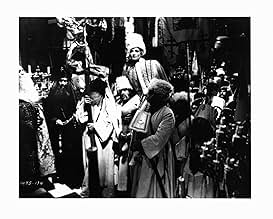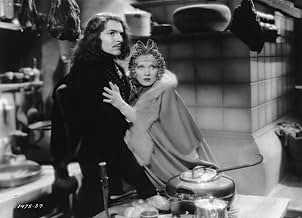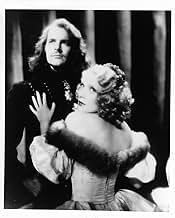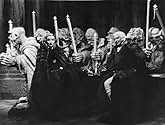Eine deutsche Adlige geht eine lieblose Ehe mit dem schwachköpfigen, labilen russischen Thronfolger ein und plant daraufhin, ihn von der Macht zu verdrängen.Eine deutsche Adlige geht eine lieblose Ehe mit dem schwachköpfigen, labilen russischen Thronfolger ein und plant daraufhin, ihn von der Macht zu verdrängen.Eine deutsche Adlige geht eine lieblose Ehe mit dem schwachköpfigen, labilen russischen Thronfolger ein und plant daraufhin, ihn von der Macht zu verdrängen.
- Regie
- Drehbuch
- Hauptbesetzung
- Auszeichnungen
- 1 wins total
- Count Lestoq
- (as Phillip Sleeman)
- Ivan Shuvolov
- (as Hans von Twardowski)
- Sophia as a Child
- (as Maria)
- Lackey #5
- (Nicht genannt)
- Count von Breummer
- (Nicht genannt)
- Sophia's Aunt
- (Nicht genannt)
Empfohlene Bewertungen
A riotous feast for the eyes, this is one of the great, unheralded films of the 1930's - enthralling for its visual impact alone. Seldom has an American film been filled with such lush imagery - tactile, grotesque, fascinating. The Russian royal palace is a charnel house full of ghouls & gargoyles - human & artistic. The actors share the scenes with fantastic statuary, twisting & writhing in silent, unspeakable pain. (Notice the tiny skeletons on the dining table.) Everywhere is death, moral decay & barbarism, even in the most powerful court in Europe.
At the center of this ossuary is the gorgeous Marlene Dietrich. Her beauty radiates, but never dominates, throughout the film. She is splendid as a young woman in a very dangerous place, who gains courage & great determination in her ordeal. Equally good is Sam Jaffe as Peter; with his leering grin & demented eyes he is the very picture of a murderous madman.
Louise Dresser, as the Empress Elizabeth, is very effective as a comic bully. John Lodge & Gavin Gordon, as Catherine's military lovers, are both stalwart. Wonderful old Sir C. Aubrey Smith has a small role as Catherine's princely father. Film mavens will spot an uncredited Jane Darwell as Catherine's nurse.
The highly emotional soundtrack, an amalgam of themes by Tchaikovsky, Mendelssohn & Wagner, explodes in the film's final moments into musical pyrotechnics.
Director Josef Van Sternberg, dubbed (correctly) "A lyricist of light and shadow" by one critic, proves this point in "Scarlet Empress" more than in any other of his films. Sternberg also knew he was losing Dietrich, and I like one scene where an actor is made up (from a side view) to resemble Sternberg. This actor is essentially the only one Marlene refuses her bed to, despite having no qualms about bedroom antics with half the Russian court. Sternberg projected himself into the role of Count Alexi, a character who has more screen time than anyone other than Dietrich. Alexi is teased by Dietrich and in the end he, um "doesn't get the girl." Sternberg knew he was no longer getting Dietrich and put this knowledge on celluloid with an awe-inspiring, even malicious fire. There are two things in this film which I really LOVE. The grotesque replicas which saturate the film are of course indicative of how the film will play out. The replicas, I suspect, were not easy or inexpensive to make--which makes them all the more fascinating, horrifying and MESMERIZING!
The background score. I have never seen a drama from the 1930s which used music more brilliantly than "Scarlet Empress." In a scene in a stable, when there is a chance that the two principals may make love, they are interrupted by the braying of a horse, which had been out of sight of the two. (According to many historians, this scene has much, MUCH deeper significance than it seems.) I cannot write what the historians have told to me on this board. It would be inappropriate. But before the horse neighs in that scene, Dietrich is twirling from a rope, and the music in the background lends immense eroticism to the scene, as does a straw which keeps going into and out of Marlene's mouth. The music combined with the beautiful lighting is stunning! There is also an opening torture scene which features a man swinging to and fro inside a huge bell, his head causing the bell to peal. Then, a quick dissolve to an innocent young lady who is flying high on her swing. THAT is a feat of genius!
If you can ignore some historical inaccuracies, which I suggest you do, and allow yourself to gorge on the beautiful lighting, music, as well as most scenes, I dare you to tell me that the film didn't MESMERIZE you! A TEN!
This pre-Production code film is a treasure throughout
WUSSTEST DU SCHON:
- WissenswertesMarlene Dietrich's own daughter Maria Riva portrayed young Sophia at the beginning of the film and it was her debut in movies.
- PatzerMost of the action takes place at The Kremlin in Moscow. The historical Empress Elizabeth, Grand Duke Peter and later Catherine spent most of their reigns in St. Petersburg, which during the 18th Century was a modern, Europeanized city.
- Zitate
Grand Duke Peter: Why are those bells ringing?
[He opens the bedroom door and addresses a man in the hall]
Grand Duke Peter: Why are those bells ringing?
Capt. Gregori Orloff: I don't know, Peter.
Grand Duke Peter: How dare you address me like that! Who are you?
Capt. Gregori Orloff: My name is Orloff, and I'm on duty as guard.
Grand Duke Peter: I'll have your head for this insolence! You're addressing the emperor!
Capt. Gregori Orloff: There is no emperor. There is only an empress.
- VerbindungenEdited from Der Patriot (1928)
- SoundtracksSymphony No.4 in F Minor, Op.36
Written by Pyotr Ilyich Tchaikovsky
Excerpts played during the opening credits and incorporated into the score often
Top-Auswahl
- How long is The Scarlet Empress?Powered by Alexa
Details
- Erscheinungsdatum
- Herkunftsland
- Sprache
- Auch bekannt als
- Die scharlachrote Kaiserin
- Drehorte
- Produktionsfirma
- Weitere beteiligte Unternehmen bei IMDbPro anzeigen
Box Office
- Budget
- 900.000 $ (geschätzt)
- Weltweiter Bruttoertrag
- 3.353 $
- Laufzeit1 Stunde 44 Minuten
- Farbe
- Seitenverhältnis
- 1.37 : 1
Zu dieser Seite beitragen



